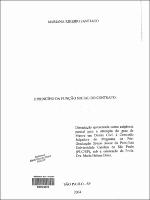Use este identificador para citar ou linkar para este item:
https://repositorio.pucsp.br/jspui/handle/handle/8437| Tipo: | Dissertação |
| Título: | O princípio da função social do contrato |
| Autor(es): | Santiago, Mariana Ribeiro |
| Primeiro Orientador: | Diniz, Maria Helena |
| Resumo: | A presente dissertação volta-se para o estudo do princípio da função social do contrato, em consonância com os mandamentos do Estado social. Para tanto, o trabalho compõe-se de 6 (seis) capítulos, a saber: No primeiro capítulo, O novo Código Civil e suas inovações na seara contratual, analisa-se, resumidamente, o contexto que culminou com o surgimento do novo Código Civil e as transformações do direito contratual, com ênfase no art. 421, a qual, institui a função social dos contratos, introduzindo o leitor nas principais polêmicas a respeito do novo instituto. No capítulo segundo, Os principios contratuais, realiza-se um confronto entre a concepção tradicional dos princípios contratuais e a concepção moderna, evidenciando todas as transformações que atingiram o instituto do contrato e a teoria contratual, elucidando as razões da adoção do princípio da função social dos contratos no ordenamento jurídico pátrio. O capítulo terceiro, Função social do contrato, é dedicado ao estudo da função social do contrato, enquanto decorrência do fenômeno da socialidade no âmbito contratual. Esse capítulo trata da conceituação e da natureza jurídica da função social do contrato, analisando as deficiências técnicas do art. 421, do Código de 2002, e traçando um paralelo desse princípio com outros institutos jurídicos. Já o capítulo quarto, Afunção social do contrato enquanto cláusula geral, embora não pretenda uma apreciação processual da função social do contrato, versa sobre as suas implicações na segurança jurídica dos contratantes, haja vista sua caracterização como cláusula geral, bem como trata do papel do aplicador do direito diante desse novo contexto e de questões de direito intertemporal. Ainda no intuito de enriquecer o conteúdo da presente dissertação, apresentamos, no quinto capítulo, A função social do contrato no direito comparado, alusões à situação de legislações estrangeiras acerca do tema, comparando-as entre si e com a posição da legislação brasileira sobre a matéria. Por fim, o capítulo sexto é uma síntese conclusiva atinente à presente exposição teórica, na qual reafirmamos nosso posicionamento diante da matéria. Seguindo esse capítulo, colacionamos a lista das fontes bibliográficas utilizadas para a edificação deste trabalho |
| Abstract: | The present study covers the investigation of the principIe of the social function of the contract, one of the new social principIes of the contract, in agreement with the statements of the welfare State. For so much, this study is composed of 6 (six) chapters, namely: In the first chapter, The new Civil Code and the innovations in the contractual area, there is an analysis, summing up the context that produced lhe edition of the new Civil Code and the transformations about the contractual law, emphasizing the article 421 that institutes the social function of the contracts, introducing the-reader in the major polemics regarding the new institute. In the second chapter, The contractual principIes, the traditional conception of the contractual principIes and the current conception have been confronted, showing all the transformations that altered the institute of the contract and the contractual theory, with the purpose of clarifying the reasons to adopt the principIe of the social function of the contracts by the Brazilian law. The third chapter, Social function of the contract, is dedicated to study the social function of the contract as a derivation from the phenomenon of the sociability in the contractual area. That chapter deals with the definition and the juridical nature of the social function of the contract, analyzing the technical deficiencies of the article 421 of the new Code, contrasting that principIe and other juridical institutes. In the fourth chapter, The social function of the contract as a general clause, although it isn't intended to be a procedural view of the social function of the contract, there's a discussion af the implications that the mentioned contractual principIe brings to the juridical safety of the contractors, as its character of a general clause; besides, it deals with the performance of the law applicator facing that new context and the questions of conflict of ruIes in time. Moreover with the purpose to enrich the contents of the present dissertation, we present, in the fifth chapter, The social function of the contract in the comparative law, allusions abaut the situation of foreign legislations on that subject, comparing them with the position af the specific Brazilian legislation. Finally, the sixth chapter is a concluding synthesis conceming this theoretical exposition, in which we reaffirm our point of view on the theme. Following that chapter, weve nominated the bibliographic sources weve used for the edification ofthis study |
| Palavras-chave: | Contratos -- Aspectos sociais Contratos -- Aspectos sociais -- Brasil |
| CNPq: | CNPQ::CIENCIAS SOCIAIS APLICADAS::DIREITO::DIREITO PRIVADO::DIREITO CIVIL |
| Idioma: | por |
| País: | BR |
| Editor: | Pontifícia Universidade Católica de São Paulo |
| Sigla da Instituição: | PUC-SP |
| metadata.dc.publisher.department: | Faculdade de Direito |
| metadata.dc.publisher.program: | Programa de Estudos Pós-Graduados em Direito |
| Citação: | Santiago, Mariana Ribeiro. O princípio da função social do contrato. 2004. 260 f. Dissertação (Mestrado em Direito) - Pontifícia Universidade Católica de São Paulo, São Paulo, 2004. |
| Tipo de Acesso: | Acesso Restrito |
| URI: | https://tede2.pucsp.br/handle/handle/8437 |
| Data do documento: | 30-Nov-2004 |
| Aparece nas coleções: | Programa de Pós-Graduação em Direito |
Arquivos associados a este item:
| Arquivo | Descrição | Tamanho | Formato | |
|---|---|---|---|---|
| Mariana Ribeiro Santiago.pdf Restricted Access | 10,9 MB | Adobe PDF |  Visualizar/Abrir |
Os itens no repositório estão protegidos por copyright, com todos os direitos reservados, salvo quando é indicado o contrário.
